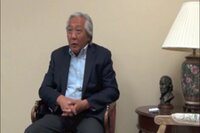| Title |
Oda, Curtis OH16_012 |
| Creator |
Weber State University, Stewart Library: Oral History Program |
| Contributors |
Oda, Curtis, Interviewee; Whitney, Brian, Interviewer |
| Collection Name |
Immigrants at the Crossroads-Ogden City Oral Histories |
| Description |
Immigrants at the Crossroads - Ogden City is a project to collect oral histories, photographs and artifacts related to the immigrant populations that helped shape the cultural and economic climate of Ogden. This project will expand the contributions made by Ogden's immigrant populations: the Dutch, Italian and Greek immigrants who came to work on the railroad and the Japanese who arrived after World War II from the West Coast and from internment camps. |
| Abstract |
The following includes the transcript and a video clip from an oral history interview with Curtis Oda. |
| Image Captions |
Curtis Oda |
| Subject |
Immigration; Japanese; Public service |
| Digital Publisher |
Stewart Library, Weber State University, Ogden, Utah, USA |
| Date |
2015 |
| Date Digital |
2017 |
| Temporal Coverage |
1877; 1878; 1879; 1880; 1881; 1882; 1883; 1884; 1885; 1886; 1887; 1888; 1889; 1890; 1891; 1892; 1893; 1894; 1895; 1896; 1897; 1898; 1899; 1900; 1901; 1902; 1903; 1904; 1905; 1906; 1907; 1908; 1909; 1910; 1911; 1912; 1913; 1914; 1915; 1916; 1917; 1918; 1919; 1920; 1921; 1922; 1923; 1924; 1925; 1926; 1927; 1928; 1929; 1930; 1931; 1932; 1933; 1934; 1935; 1936; 1937; 1938; 1939; 1940; 1941; 1942; 1943; 1944; 1945; 1946; 1947; 1948; 1949; 1950; 1951; 1952; 1953; 1954; 1955; 1956; 1957; 1958; 1959; 1960; 1961; 1962; 1963; 1964; 1965; 1966; 1967; 1968; 1969; 1970; 1971; 1972; 1973; 1974; 1975; 1976; 1977; 1978; 1979; 1980; 1981; 1982; 1983; 1984; 1985; 1986; 1987; 1988; 1989; 1990; 1991; 1992; 1993; 1994; 1995; 1996; 1997; 1998; 1999; 2000; 2001; 2002; 2003; 2004; 2005; 2006; 2007; 2008; 2009; 2010; 2011; 2012; 2013; 2014; 2015 |
| Item Size |
35p.; 29cm.; 2 bound transcripts; 4 file folders. 1 video disc: digital; 4 3/4 in. |
| Medium |
oral histories (literary genre) |
| Spatial Coverage |
Ogden, Weber County, Utah, United States, http://sws.geonames.org/11788968, 41.22809, -111.96766 |
| Type |
Text; Image/MovingImage |
| Conversion Specifications |
Filmed using a Sony HDR-CX430V digital video camera. Sound was recorded with a Sony ECM-AW3(T) bluetooth microphone. Transcribed using WAVpedal 5 Copyrighted by The Programmers' Consortium Inc. Digitally reformatted using Adobe Acrobat Xl Pro. |
| Language |
eng |
| Rights |
Materials may be used for non-profit and educational purposes; please credit University Archives, Stewart Library, Weber State University. |
| Source |
Oda, Curtis OH16_012; Weber State University, Stewart Library, University Archives |
| Format |
application/pdf; video/mp4 |
| ARK |
ark:/87278/s63m8xbw |
| Setname |
wsu_webda_oh |
| ID |
104212 |
| Reference URL |
https://digital.weber.edu/ark:/87278/s63m8xbw |
| Title |
Oda, Curtis OH16_012 |
| Creator |
Weber State University, Stewart Library: Oral History Program |
| Contributors |
Oda, Curtis, Interviewee; Whitney, Brian, Interviewer |
| Description |
Immigrants at the Crossroads - Ogden City is a project to collect oral histories, photographs and artifacts related to the immigrant populations that helped shape the cultural and economic climate of Ogden. This project will expand the contributions made by Ogden's immigrant populations: the Dutch, Italian and Greek immigrants who came to work on the railroad and the Japanese who arrived after World War II from the West Coast and from internment camps. |
| Image Captions |
Curtis Oda |
| Biographical/Historical Note |
This is an oral history interview with Curtis Oda, conducted by Brian Whitney on May 14, 2015. Curtis Oda, the grandson of Japanese immigrants, talks about his Japanese heritage and examines his father's life growing up in Northern Utah. He also describes being a part of the Japanese community and his public service. |
| Subject |
Ogden (Utah); Immigration; Japanese; Public service |
| Digital Publisher |
Stewart Library, Weber State University, Ogden, Utah, USA |
| Date |
2015 |
| Date Digital |
2017 |
| Temporal Coverage |
1877-2015 |
| Item Size |
35p.; 29cm.; 2 bound transcripts; 4 file folders. 1 video disc: digital; 4 3/4 in. |
| Medium |
oral histories (literary genre) |
| Spatial Coverage |
Ogden, Weber County, Utah, United States, http://sws.geonames.org/11788968, 41.22809, -111.96766 |
| Type |
Text; Image/MovingImage |
| Conversion Specifications |
Filmed using a Sony HDR-CX430V digital video camera. Sound was recorded with a Sony ECM-AW3(T) bluetooth microphone. Transcribed using WAVpedal 5 Copyrighted by The Programmers' Consortium Inc. Digitally reformatted using Adobe Acrobat Xl Pro. |
| Language |
eng |
| Rights |
Materials may be used for non-profit and educational purposes; please credit University Archives, Stewart Library, Weber State University. |
| Source |
Oda, Curtis OH16_012; Weber State University, Stewart Library, University Archives |
| Format |
application/pdf |
| Setname |
wsu_webda_oh |
| ID |
104405 |
| Reference URL |
https://digital.weber.edu/ark:/87278/s63m8xbw/104405 |





